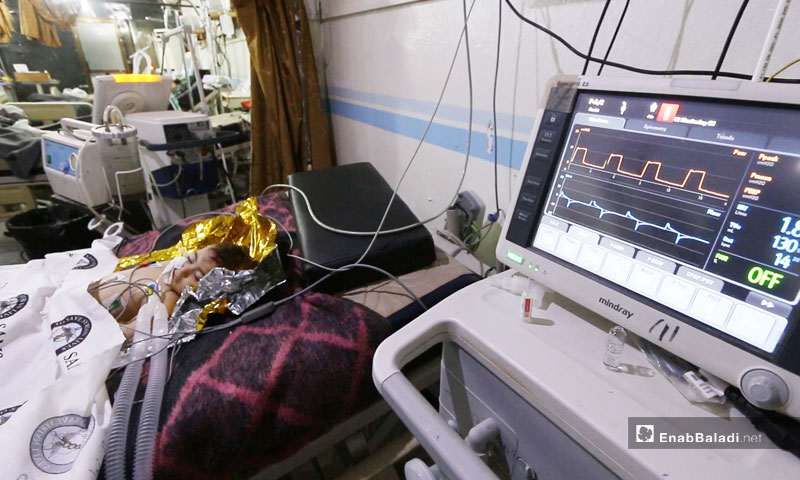Given the dramatically aggravate situation in Syria’s Idlib province, more than 900,000 civilians were forced to flee their homes or shelters in the southern and western Aleppo countryside and the southern and eastern countryside of Idlib. Then, they headed to resettle in more secure areas, such as Afrin, Azaz, al-Rai and al-Bab, in the northern countryside of Aleppo, and northern Idlib near the Turkish border.
The number of internally displaced persons (IDPs), which increases on a daily basis, has intensified pressure on many services sectors in the areas to which the IDPs have gone, including the medical sector.
Enab Baladi monitored the state of medical centers and patients in the northwestern areas of Aleppo.
“Cruel” reality
The correspondents of Enab Baladi conveyed a realistic image of the exacerbating medical situation, amid the mounting number of the IDPs.
Despite the availability of medical points, centers, and hospitals in the region, patients have to wait more than three hours to get a medical examination by a doctor, which is difficult for children, old people, and people with urgent medical cases.
Head of nurses, midwives, and health technicians association in the town of Marea in northern Aleppo province, Muhammad al-Hussein spoke to Enab Baladi about the acute crises of medical centers in the area; namely in extreme overcrowding in the medical centers and lack of essential medicines such as medications for diabetes and heart disease.
However, al-Hussein stressed that there are sufficient medical professionals to meet up the needs of the displaced.
The director of the medical office in the town of Suran, Khalil Ayat, described the medical reality in the northern countryside of Aleppo, especially in Suran and its countryside, as “harsh,” pointing out that the three health centers in his town receive massive numbers of displaced people.
Solutions in progress
The pressure on Suran medical center required the opening of new medical points in the neighboring villages of Kufra and Kafrgan as solutions to receive the growing numbers of displaced people and provide better and optimal services, according to Ayat.
According to al-Hussein, the medical center in the town of Marea doubled the number of vaccines within its routine vaccination program in order to match the health needs of the IDPs.
To alleviate the suffering of the displaced people, al-Hussein called for the necessity of distributing medical teams that simulate the IDP reality and their requirements of medicines and medical supplies.
Al-Hussein added that the IDP camps must be set up duly, provided with essential services so that they will not be a source of transmitting infectious diseases.
According to an assessment by the United Nations Office for the Coordination of Humanitarian Affairs (OCHA), specialized clinics are classified among the primary needs in northwestern Syria, amid shortages of medical staff and equipment to protect them from infectious diseases. The mobile health clinics require additional support, especially for chronic diseases.
The lack of specialized medical centers presents a high risk to the lives of patients with certain diseases, such as chronic kidney patients who need hemodialysis sessions at least twice a week.

